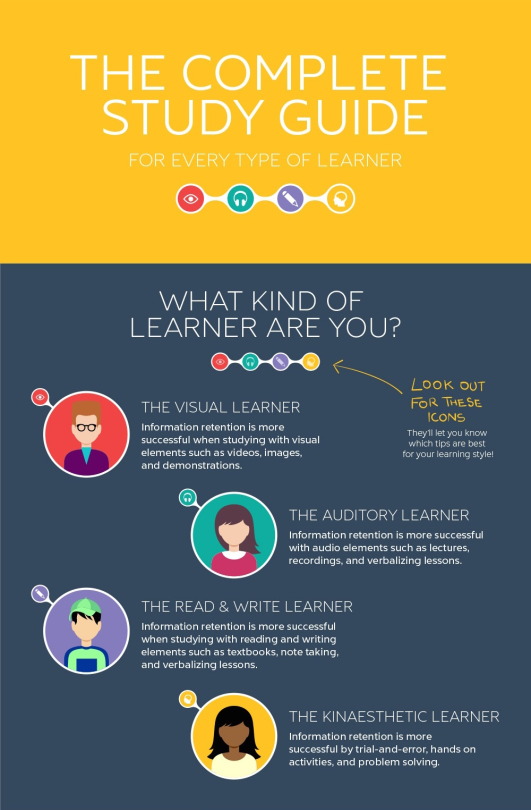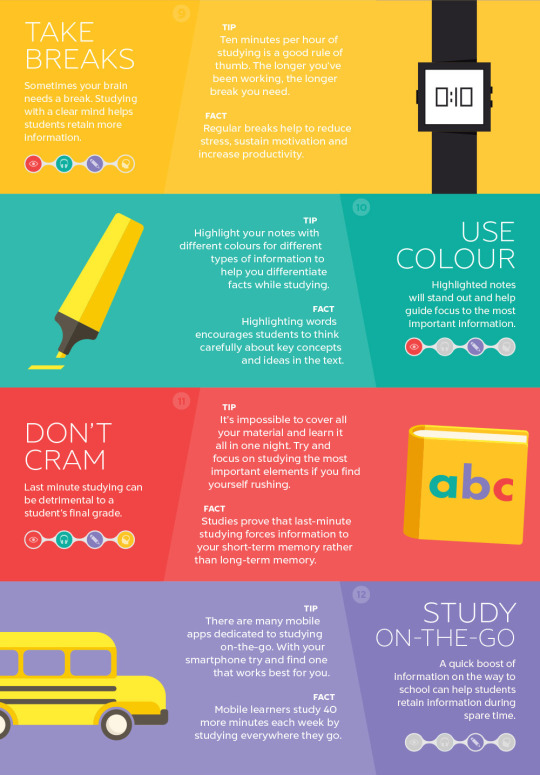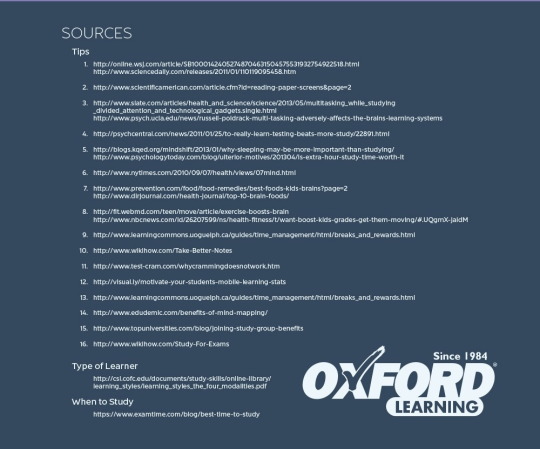Photo







An Infographic Of Useful Tips For All Types Of Learners
24K notes
·
View notes
Quote
Winners are not people who never fail. Winners are people who never quit.
Unknown (via onlinecounsellingcollege)
2K notes
·
View notes
Photo

09.02.17 || 4/100 DAYS OF PRODUCTIVITY
before i went to bed, I read over all the aggression notes i took today for psychology with a cup of hot chocolate and whipped cream.
thank you to @emmastudies for these amazing monthly wallpapers!
520 notes
·
View notes
Note
Hi, I always find while studying even though I spend a lot of time and effort my grades don't really reflect that. Do you think I should study "smarter" or is it that I need to actively concentrate. What I'm really asking is, how do you utilize your study time effectively?
Hi! If you’re passively studying, than that is probably your answer. You’re better having an hour worth of solid work than 3 hours of passively reading and highlighting etc. A few things that might help could be:
make a short to-do list - write down 3 things you’d like to do in your studying time. Do the most important or the one that will take the longest first.
schedule and plan your time - try to work in blocks of about 25-30 minutes with a couple of minutes break in between. Your attention span is generally around that amount of time so if you can focus for the entire time, you’re able to get a lot more done. Use apps like Forest or Pomodoro to monitor your time!
put away any distractions - leave your phone in another room and behind you. Forget it is there and concentrate on what you’ve got to do. Extensions for your browser like RescueTime can help you avoid going on websites that distract you.
figure out what study methods work for you - everyone is different and has different methods of memorise, learning and understanding. Some people know they learn best with visually or listening. If you don’t know, take this quiz to try and identify your learning type. My study method is as follow: read my notes/textbooks and type up notes, print them and highlight/annotate them, create mindmaps/flashcards for things I need to definitely remember, write practice essays (either full essays or just bullet points), do practice papers and read sample answers.
don’t be a passive studier - it is easy to kind of passively read your notes or do the easy parts of the course because you feel like you’re studying but really you’re just doing something that isn’t using much brain power. As you revise things that you already remember, keep it brief, don’t spend a load of time on it. Spend time on the harder things. That way you won’t be freaking out if you’re asked something that you don’t understand because you couldn’t be bothered to learn it.
tailor your notes/workings to the subject - using the same method for every subject sometimes just instant effective, especially when some subjects are content heavy and others are concept based! Figure out the most practical way to approach a subject and make sure you’re making relevant notes to the topics. (For example in my content heavy subjects I would spend time finding evidence for essay questions where I needed to make a judgement rather than copying down descriptions about the topic. In those subjects I was asked to “evaluate/assess/examine” and not explain so I needed to find extra resources to actually make a judgement and not use know the textbook word for word.
stay positive - knowing you have a lot to study is daunting, there is no doubt about it. Try to think that you’re doing something about it and not leaving it till the last minute. You’re better off studying than failing. I’d rather study than regret not revising whilst I had a chance.
I hope this helps xx
83 notes
·
View notes
Photo

New Year, New Desk
43 notes
·
View notes
Photo

library day the other day. it’s been disgustingly busy, but it’s going okay.
11K notes
·
View notes
Photo

Writing an essay without any structure is like trying to find your way around an unfamiliar place without a map; frustrating, ineffective, and a bit of a garbled mess. Structure gives your essay a clear voice and coherency and makes marking a lot easier for your teacher or tutor! Here are a few general tips I often use when writing essays to maximise the effect of my argument and achieve the best results I can both in high school and university.
Text structure
While the content of essays varies, the skeleton structure never changes. In order to clearly articulate an idea, an essay needs a beginning, middle, and an end.
Introduction
Start with a macro sentence - use an interesting quote, fact, or idea which gives the reader a broad sense of what your essay will cover. This is the reader’s first impression of your essay and can determine their whole attitude while reading it, so make it effective!
Briefly outline the main ideas and thesis - in absence of an abstract, your introduction will need to show the main ideas you will be covering so as to support your thesis, or answer the essay question. You will need to clearly express your position and how you intend to argue the point.
Set the limits - sometimes, the scope of an essay question can be very broad, or perhaps there’s a focus to your thesis not all ready indicated. Define the limits of your essay, whether they be a set of years for a history topic, or looking at specific artists who contributed to an art style.
Define key terms - if a term is important to the understanding of your essay, or perhaps you’ve taken your own approach to its meaning, be sure to define it in your introduction!
Body
Separate each idea into a paragraph - ideas can generally be separated chronologically or conceptually. The section below explores this in more detail!
Start every paragraph with a topic sentence - introduce what the paragraph will discuss and how it relates to your thesis. Signpost it with critical words to make it easier to understand exactly what you are addressing. Ensure it is clear and to the point!
Make a claim and the support it - like in reality, when you make a claim you need to provide evidence to support it so it can be taken seriously. Make your claim early on in the paragraph, generally in the topic sentence, give relevant detail and explanation, analyse it, and then justify it with authoritative quotes, sources, examples, etc.
End every paragraph with a linking sentence - refer back to your thesis or question and make sure what you set out to cover in the paragraph actually addresses it! This is an opportunity to draw a link between this paragraph and the next.
Conclusion
Do more than just restate your points - your conclusion is more than just a rehash of your introduction. Link ideas together and demonstrate how they are interconnected on a less superficial level. An English teacher once told me, your essay is like a mountain. You put in all your hard work to climb it in your introduction and body paragraphs, your conclusion is a chance to look back, make connections where there were none before, and solidify your argument.
Establish the overarching theme and idea - what idea underlies all the points you have made? How does it relate to your thesis?
Draw a profound and insightful conclusion - what are the implications of this? Is there relevance today? This can transform a standard essay into a more profound and overall, more interesting essay.
Don’t introduce any new information - your essay is complete! All your information should have been expressed in the body paragraphs, so nothing new should be introduced here.
Reaffirm your thesis - restate it with some finality! Your body has provided all this evidence to support it, remind them of this.
Chronological or Conceptual?
For the most part, an essay can take one of two approaches; a chronological approach, where each body paragraph follows the text, history, etc., sequentially, or a conceptual approach, where the main idea is broken down into its constituent elements, each addressed in their own paragraph(s).
In my experience, conceptual essays usually score higher, showing a greater sense of understanding of the topic and its inner workings. You can demonstrate a funnel effect more easily, where each element funnels down from its body paragraph to the conclusion, contributing to the overall idea of the essay. A chronological approach, however, can be easier to follow and is occasionally implicit within the essay question. Choosing which approach to use depends on which you are comfortable writing with, the demands of the essay or your teacher, and can vary from essay to essay.
Continuity and Cohesion
Something I think is highly underrated, yet critical to holding an essay together, is transition words and phrases. They create continuity and cohesion between ideas and paragraphs, and serve as a bridge of sorts within your overall structure. Here are a few posts which have comprehensive lists of transition words and phrases:
Transition Words for Essays - @staedtlers-and-stabilos
Essay Transition Phrases - @study-like-you-mean-it
Transition Words For Your Essays - @soniastudyblr
I hope this can help with structuring your essays and getting the best marks you can! Please message me if you have any questions :)
Other essay writing posts:
How to reduce your word count
Understanding the Question
How to Write a Killer Unprepared Text Essay
14K notes
·
View notes
Photo

Favourite Quote
11 notes
·
View notes
Photo

TIPS ON HOW TO OVERCOME PROCRASTINATION
Examinations are finally around the corner and there’s really no time to play around. Everyone’s worst antagonist - Procrastination. That guy is always out there trying to lure students like us to stop working hard and get the grades that we deserve. Here are some tips that work for me that help me to overcome procrastination. Please pardon my English. Thanks!
Get a bullet journal. It’s okay if you don’t own one, make sure you have a small notebook that you always keep around with you. Write down deadlines, assignments or anything that you need to get things done. Write it down. I promise, if you think that you could remember what your lecturers or teachers have assigned you task without writing it down, I am sure that once you stepped out from the lecture hall or the classroom, you will probably forget about it. Bullet journal is effective as you are able to plan ahead, planning what you have to do on a certain day.
Be motivated. Yes, I know it’s hard to be motivated to study. For me, it’s even hard to sit in my seat for a good three hours without walking in and out from the kitchen, staring at my phone wondering what I am doing with life and I swear, it is hard to get your head together and inspire yourself to get things done. Write down some motivational quotes on some sticky notes and stick them on your walls, where you are able to see them when you are studying. I swear some of the quotes I had on my walls are “Do it now! Sometimes ‘later’ becomes ‘never’” and “There’s no substitute for hard work”. There are thousand of motivational quotes out there on Google. Search it up, probably it would keep you motivated.
Time management. This is seriously one of the biggest concern I still have - managing my time productivity. For me, I used the 60 minutes study and 20 minutes break. And I would repeat the cycle for at least two more rounds before ending my study session. I installed the ‘Forest’ app on my phone a week ago and it really helps me to concentrate and stay away from my phone, which will come to the next tip. And you don’t have to study the same topic for five hours straight. Balance your subjects so that you would not suffer when examinations are nearing.Stay away from the social media. Get out of Twitter, Instagram, Tumblr, Snapchat or whatever social media you have and get your shit done. Yes, there are times where you wanted to scroll your notifications and stuff but think again, do you really want to waste that few minutes on that? Probably you should revise your work before you even go to the websites. Social media can be a huge asshole and it would disturb you from having a productive study session, so try your best to stay away from these apps.
Take breaks. Who on Earth tell you to study 24/7? Even the smartest kid in the world would not do that, unless your burning midnight oil, which you should not even do that in the first place. Take some breaks. 20 minutes, 30 minutes, take as many breaks as you want. Relax your mind. Reward yourself from all the pen inks you used up so far. But wait, do not take too many breaks as it will lead you to procrastination. So get enough rest and start doing your work!
Prioritize the important one first. Hello, if your assignment is due the next day, shouldn’t you be doing that assignment first? Yes, prioritize your assignment according to due dates. If you are studying for an examination, study the ones that are nearing. Or maybe study those that you are weak in so that you could spend more time on those topics or subjects. At the end of the day, all you want on your report card the grades that you wanted, and not disappointed on the bad grade you have on that single subject that you thought you could do better in.
Lastly, stay positive. Having negative thoughts may lead you to procrastinate your studies, so be happy and smile. Being positive will not only change the environment around you but also yourself. You will tend to be more focused and motivated to study well so that your preparation for your examinations will run smoothly.
I really hope that this tips will help you to overcome your procrastination. Since this is my first time creating a study guide, I hope all of you could forgive any mistake I did in this post and good luck to those who are busy preparing themselves for their examinations! We, the studyblr community are cheering on you!
941 notes
·
View notes
Photo

hello! My name is Lena, I’m fifteen, and this is me trying to join the studyblr community ♡
If you are reading this, I would absolutely love it if you would check out my blog :)
I’m also looking for many blogs to follow! Please like/reblog this post and I’ll check it out (or leave me a message) ♡
Have a lovely day! x
–
21.1.2016
Page from my kikki.k planner / studying for mock exams!
4K notes
·
View notes
Photo








Oh, you got your study voice. Yep, it goes with my pop quiz walk and my term paper face.
16K notes
·
View notes
Photo


Wishing you all a happy weekend! This week I decided to go with a yellow theme. Since I love to collage, I decided to add a few clippings to this week’s spread as well. One week of AP testing is down and we’ve got one more week to go! To my fellow AP students and those of you taking the SATs this weekend, I wish you good vibes and a good night’s sleep. Remember not to study too hard!
3K notes
·
View notes
Photo

Studying at Kangaroo Valley
7 notes
·
View notes




